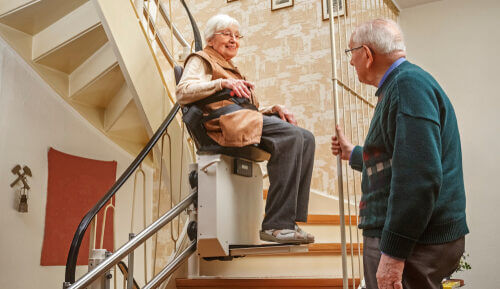
Page contents
Hoarding is when somebody collects or accumulates a large number of things, usually stored without any particular order. The person who hoards may never use many of the items in their hoard but enjoys acquiring them and has great difficulty in getting rid of them.
What sort of items people hoard can vary wildly, from a collection of valuable items that has got out of control to actual rubbish. These hoards can severely affect the person’s living conditions and quality of life.
Between 2-5% of people in the UK have hoarding behaviour, with a significant amount of these being older people.
40% are people over 60
Megan Karnes is an activist and founder and chair of charity Hoarding UK. She says: “It is not only an older person’s disorder, but I would say probably 40% of our participants are people over 60.”
The World Health Organisation recognised hoarding behaviour as a clinical disorder in 2018.
Why do older people hoard?
People of all ages hoard for many reasons. In older people, dementia as well as physical and practical reasons can often cause their possessions get out of hand.
Older people can find it more physically demanding to keep on top of housework or clear an existing hoard. They often also have more possessions than they have room for through inheritance or because they have downsized their home after their children have flown the nest.
Meanwhile, dementia can affect a person’s abilities with planning and organising. What’s more, people living with dementia can be less likely to really see their hoard; they may not be fully aware of how big it is or the dangers it could pose, such as fire hazards or risk of infestation.
For older people for whom their hoarding has gone on for decades, it can be time that has caused such a large amass of belongings. If they never address the mental health or psychological reasons behind their hoarding, it simply builds up.
How do trauma and anxiety trigger hoarding?
Ms Karnes explains: “The level of hoard correlates to the level of trauma and anxiety. I’m using the word trauma in a ‘lived experience’ way, so, people who’ve lost a boyfriend, lost a job, it’s not necessarily something that would be considered classic trauma. It’s often that kind of loss of where you think you’re going.
“One of the reasons it might be more significant in older people is that it grows on itself. Hoarding falls under Obsessive Compulsive Spectrum. On one side of the graph is a person who is obsessively tidy, so has the classically known OCD, of which they’re only 1.2% of the population, so with hoarding we already have double. So this person is excessively tidy, everything has to be neat, everything has to be minimalist.
“On the other side, to the person who hoards we say donate, discard, recycle, sell, give away. The trauma is triggered, the anxiety is triggered.
“The person feels that they can’t deal with that feeling, they put it down. So that is the compulsion. Avoidance is a behaviour. They put it down because it feels too horrible to deal with it.
“Under the Obsessive Compulsive Spectrum, or any anxiety disorder, there’s the bad feeling. Doing something, not doing something, thinking something, to make that bad feeling go away. Because you don’t deal with the bad feeling it gets stronger. That is about control and perfectionism; control is a driver within any anxiety disorder. So basically, ‘I don’t want to feel this way and you also can’t make me feel this way’. Managing that feeling is about control. So basically anxiety – ‘I have a bad feeling, I do something, say something, don’t do something, think something – because of that I feel a little better but because I don’t deal with it, it keeps going around in that circle’, and that’s about controlling that bad feeling.”
When does collecting become hoarding?
The things that people choose to hoard are always significant, even if they appear worthless to others. There is an emotional attachment to the possessions themselves.
They can be strongly connected to their sense of identity, particularly a past identity which they have difficulty letting go of, which can be more prevalent in older people. For example, a retired journalist might collect endless copies of the newspaper they wrote for as a means of holding onto that identity. Or a mother whose children are grown up and gone might nostalgically keep and treasure all their toys, long-outgrown clothes and every picture they ever drew.
Many people collect things that they prize, such as memorabilia connected to a passion they have that forms part of their identity. Often, it’s collected in the belief that it could be worth something, or useful in some way.
Clutter Image Rating Scale
To determine whether a collection has become a hoard, the Clutter Image Rating Scale is used. This is a chart showing 9 numbered images, each with a greater degree of clutter than the last. You can compare each room to the images to see which number image it looks the most like.
Ms Karnes says: “At 4, the Care Act requires that we prevent escalation of risk, so we would put in a preventative programme at that point, the same programme that we would put in at significant hoard but preventative. Between 4 to 6 identifies as a hoard, typically. We would always note if there are hazardous materials at lower levels that would likely cause squalor and infestation. So even if we’re at a level 2, if there’s infestation and squalor we need to deal with that.”
How can hoarding impact a person’s health?
A hoard can present dangers to both physical and mental health. Substantial hoards can create the risk of dust mites, mould, infestation, fire, trips and falls. For older people who may already be frail or have health problems, these risks are only greater.
Shame and lack of confidence
The toll on mental health can be significant too. People often feel shame about their hoard which can cause a lack of confidence and even social isolation. Moreover, if they hoard to cope with difficult emotions, the presence of all this stuff provides a constant reminder of the bad feelings they are dealing with.
As Ms Karnes says: “I’ll say this about anyone living in a hoard – I don’t wake up every day, open my eyes and see the trauma, whereas when you are a person who hoards, you can’t look away from it. The hoard is connected to the trauma.”
Can someone be forced to clear their hoard if it is a danger to them?
Many of us have seen the programmes on TV where a person who hoards is told that it is a health hazard and given a set time period in which to clear their hoard. There are companies that are happy to help with the clearing itself, but if the reason behind the hoarding is not addressed, it will often, inevitably, return.
Ms Karnes explains: “Services go into your house and say your house is full of stuff, fix it. And the person who is intelligent and aware and alert says yes or no.
Hoarding is a recognised clinical disability
“In the Mental Capacity Act, capacity states that a person has to be able to take the information that you’re giving, understand it, use that information to be able to make a decision and then express that decision. This, a person who hoards can do. But their disability means that they can’t do what they say they’re going to. If they could let go of it we wouldn’t be there. If they are hoarding, the thing that they can’t do is let it go. That is a recognised clinical disability now.
“They say yes I’ll do it, come back in three weeks. We wouldn’t say to a person in a wheelchair, ‘you’ve got to run to the door in three weeks’. If you say no I won’t do this, are you making a decision because you’ve decided that you want to be evicted from your home? Or are you making a decision because your disability won’t allow you to let it go? So it’s an executional capacity. It’s not that the person is dissociated or delusional or in denial, it’s that the disorder means that they don’t have executional capacity.”
Please note that if the case is that somebody is ordered to clear their hoard, people who hoard are eligible for Statutory Advocacy under the Care Act. Hoarding UK will supply free remote advocacy for people who have no one to speak on their behalf and meet eligibility criteria.
How to help someone who hoards
The key to helping a person who hoards is to support them to address the reasons they hoard and deal with those at their own pace. Then they may be ready to clear their clutter of their own volition in their own time.
Practical steps you could take to support them
- Learn about hoarding and try to understand why they have this behaviour.
- Direct them to helplines for people with hoarding behaviour (see below).
- Encourage them to seek counselling to manage the emotions behind their hoarding. Their GP can refer them to counselling or an appropriate therapy.
- Avoid enabling them. A person who hoards can be the easiest person in the world to find gifts for, but try to avoid adding to their possessions, even though it’s in good faith. Also avoid offering to store things for them.
- Leave their things alone. It can be extremely distressing for some who hoards if you discard their possessions without their permission. Even though it may seem like rubbish to you, and in many cases it is, it’s essential to respect that these are their belongings, regardless of what they are. If you live together, you could instead set boundaries about which spaces must be kept clear and which they can use for storage, and gently encourage them to get rid of a few things when recycling day comes around.
- See what support is in your area. Many areas have hoarding support groups that help people to find other ways to manage their emotions and enable them to slowly start reducing their clutter.
What support is there for hoarding?
Ms Karnes says: “In Greater London we have what we call the In-Home Support Group, and that is a programme where we work with people for at least a year. We deliver sessions in-home which are both therapeutic and practical in nature, there’s no great hurry, we are also building a relationship. They have to get used to making this decision [to throw something away], then we would be checking in how they’re doing each week. The outcome is the house is safer – we would not be working towards house beautiful. People are not coming back to us, so that is the difference. They’re figuring out a way for themselves to deal with this dysfunctional coping mechanism and opting out of it.
“We will not deliver this programme to someone who has any impactable engagement with dementia, because ours is a learning model, so we would work to put a support in place for that person that is a best interest decision.”
Helplines
| Hoarding UK | 020 3239 1600 | info@hoardinguk.org |
| Anxiety UK | 03444 775 554 | support@anxietyuk.org.uk |
| OCD Action | 0300 636 5478 | support@ocdaction.org.uk |
| Age UK | 0800 678 1602 | |
| Mind | 0300 123 9939 | info@mind.org.uk |


